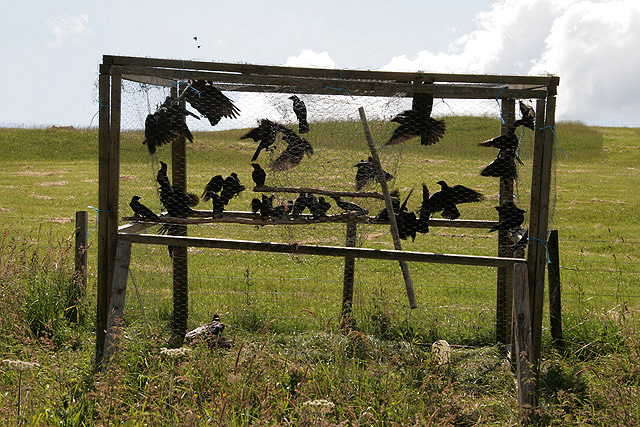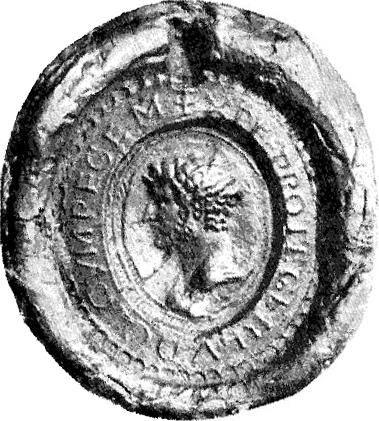|
Henry I The Fowler
Henry the Fowler ( or '; ; – 2 July 936) was the duke of Saxony from 912 and the king of East Francia from 919 until his death in 936. As the first non-Franks, Frankish king of East Francia, he established the Ottonian dynasty of kings and Holy Roman Emperor, emperors, and he is generally considered to be the founder of the Kingdom of Germany, medieval German state, known until then as East Francia. An avid hunter, he obtained the epithet "the Fowler" because he was allegedly fixing his Bird trapping, birding nets when Courier, messengers arrived to inform him that he was to be king. He was born into the Ottonian dynasty, Liudolfing line of Saxon dukes. His father Otto I, Duke of Saxony, Otto I of Saxony died in 912 and was succeeded by Henry. The new duke launched a rebellion against the king of East Francia, Conrad I of Germany, over the rights to lands in the Duchy of Thuringia. They reconciled in 915 and on his deathbed in 918, Conrad recommended Henry as the next king, ... [...More Info...] [...Related Items...] OR: [Wikipedia] [Google] [Baidu] |
King Of East Francia
This is a list of monarchs who ruled over East Francia, and the Kingdom of Germany (), from Treaty of Verdun, the division of the Francia, Frankish Empire in 843 and Dissolution of the Holy Roman Empire, the collapse of the Holy Roman Empire in 1806 until German Revolution of 1918–1919, the collapse of the German Empire in 1918: East Francia (843–962) Carolingian dynasty Conradine dynasty Ottonian dynasty Holy Roman Empire (962–1806) The title "King of the Romans", used in the Holy Roman Empire, was, from the coronation of Henry II, considered equivalent to King of Germany. A king was chosen by the German electors and would then proceed to Rome to be Coronation of the Holy Roman Emperor, crowned emperor by the pope. Ottonian dynasty (continued) Salian dynasty Supplinburger dynasty Hohenstaufen dynasty Interregnum Changing dynasties Habsburg dynasty Modern Germany (1806–1918) Confederation of the Rhine (1806–1813) German Confederation (18 ... [...More Info...] [...Related Items...] OR: [Wikipedia] [Google] [Baidu] |
Memleben
Memleben is a village and part of the Kaiserpfalz, Saxony-Anhalt, Kaiserpfalz municipality of the Burgenlandkreis district, in Saxony-Anhalt, Germany. It is known for former Memleben Abbey, the site of a medieval ''Kaiserpfalz''. Geography It is located southwest of Nebra (Unstrut), Nebra on the Unstrut River. The former municipality was merged with the neighbouring villages of Bucha, Saxony-Anhalt, Bucha and Wohlmirstedt into Kaiserpfalz on 1 July 2009. Nowadays the village has about 800 inhabitants. It also has an animal exhibition park with a small circus. History A settlement called ''Mimelebo'' was already documented in a 780 register of the Hersfeld Abbey estates, issued by Archbishop Lullus, Lullus of Mainz. In the 10th century the ''Pfalz'' or ''villa regia'' of Memleben, a kind of seasonal king's court, was one of the favourite places of the German king Henry the Fowler and his son Emperor Otto I, Holy Roman Emperor, Otto I. Henry the Fowler died here, probably by a stro ... [...More Info...] [...Related Items...] OR: [Wikipedia] [Google] [Baidu] |
Conrad I Of Germany
Conrad I (; c. 881 – 23 December 918), called the Younger, was the king of East Francia from 911 to 918. He was the first king not of the Carolingian dynasty, the first to be elected by the nobility and the first to be anointed. He was chosen as the king by the rulers of the East Frankish stem duchies after the death of young King Louis the Child. Ethnically Frankish, prior to this election he had ruled the Duchy of Franconia from 906. Early life Conrad was the son of duke Conrad of Thuringia (called ''the Elder'') and his wife Glismoda, probably related to Ota, wife of the Carolingian emperor Arnulf of Carinthia and mother of Louis the Child. The Conradines, counts in the Franconian Lahngau region, had been loyal supporters of the Carolingians. At the same time, they competed vigorously for predominance in Franconia with the sons of the Babenbergian duke Henry of Franconia at Bamberg Castle. In 906 the two parties battled each other near Fritzlar. Conrad the Elder was ki ... [...More Info...] [...Related Items...] OR: [Wikipedia] [Google] [Baidu] |
Rebellion
Rebellion is an uprising that resists and is organized against one's government. A rebel is a person who engages in a rebellion. A rebel group is a consciously coordinated group that seeks to gain political control over an entire state or a portion of a state. A rebellion is often caused by political, religious, or social grievances that originate from a perceived inequality or marginalization. ''Rebellion'' comes from Latin ''re'' and ''bellum'', and in Lockian philosophy refers to the Right of revolution, responsibility of the people to overthrow unjust government. Classification Uprisings which revolt, Resistance movement, resisting and taking direct action against an authority, law or policy, as well as organize, are rebellions. An insurrection is an uprising to change the government. If a government does not recognize rebels as belligerents, then they are insurgents and the revolt is an insurgency. In a larger conflict, the rebels may be recognized as belligerents ... [...More Info...] [...Related Items...] OR: [Wikipedia] [Google] [Baidu] |
Courier
A courier is a person or organization that delivers a message, package or letter from one place or person to another place or person. Typically, a courier provides their courier service on a commercial contract basis; however, some couriers are government or state agency employees (for example: a diplomatic courier). Duties and functions Couriers are distinguished from ordinary mail services by features such as speed, security, tracking, signature, specialization and individualization of express services, and swift delivery times, which are optional for most everyday mail services. As a premium service, couriers are usually more expensive than standard mail services, and their use is normally limited to packages where one or more of these features are considered important enough to warrant the cost. Courier services operate on all scales, from within specific towns or cities, to regional, national and global services. Large courier companies include DHL Express, DHL, DTDC, FedEx ... [...More Info...] [...Related Items...] OR: [Wikipedia] [Google] [Baidu] |
Bird Trapping
Bird trapping techniques to capture wild birds include a wide range of techniques that have their origins in the hunting of birds for food. While hunting for food does not require birds to be caught alive, some trapping techniques capture birds without harming them and are of use in ornithology research. Wild birds may also be trapped for their display in captivity in zoological gardens or for keeping as a pet. Bird trapping was formerly unregulated, but to protect bird populations most countries have specific laws and regulations. Luring Birds are lured into the vicinity of traps through the use of suitable habitat patches where the birds are known to visit. A specific location may be further modified by the provision of food, the use of decoy birds, the use of calls, or owls that may induce mobbing. Male birds of some species are used as decoys during the breeding seasons to challenge and beckon other males from nearby. Larks were formerly attracted using a rotary paddle, som ... [...More Info...] [...Related Items...] OR: [Wikipedia] [Google] [Baidu] |
Hunter
Hunting is the human practice of seeking, pursuing, capturing, and killing wildlife or feral animals. The most common reasons for humans to hunt are to obtain the animal's body for meat and useful animal products ( fur/ hide, bone/tusks, horn/antler, etc.), for recreation/taxidermy (see trophy hunting), although it may also be done for resourceful reasons such as removing predators dangerous to humans or domestic animals (e.g. wolf hunting), to eliminate pests and nuisance animals that damage crops/livestock/poultry or spread diseases (see varminting), for trade/tourism (see safari), or for ecological conservation against overpopulation and invasive species (commonly called a cull). Recreationally hunted species are generally referred to as the ''game'', and are usually mammals and birds. A person participating in a hunt is a hunter or (less commonly) huntsman; a natural area used for hunting is called a game reserve; and an experienced hunter who helps organise a ... [...More Info...] [...Related Items...] OR: [Wikipedia] [Google] [Baidu] |
Kingdom Of Germany
The Kingdom of Germany or German Kingdom ( 'kingdom of the Germans', 'German kingdom', "kingdom of Germany", ) was the mostly Germanic language-speaking East Frankish kingdom, which was formed by the Treaty of Verdun in 843. The king was elected, initially by the rulers of the stem duchies, who generally chose one of their own. After 962, when Otto I was crowned emperor, East Francia formed the bulk of the Holy Roman Empire, which also included the Kingdom of Italy and, after 1032, the Kingdom of Burgundy. Like medieval England and medieval France, medieval Germany consolidated from a conglomerate of smaller tribes, nations or polities by the High Middle Ages. The term ('king of the Germans') first came into use in Italy around the year 1000. It was popularized by the chancery of Pope Gregory VII during the Investiture Controversy (late 11th century), perhaps as a polemical tool against Emperor Henry IV. In the 12th century, in order to stress the imperial and transna ... [...More Info...] [...Related Items...] OR: [Wikipedia] [Google] [Baidu] |
Holy Roman Emperor
The Holy Roman Emperor, originally and officially the Emperor of the Romans (other), Emperor of the Romans (; ) during the Middle Ages, and also known as the Roman-German Emperor since the early modern period (; ), was the ruler and head of state of the Holy Roman Empire. The title was held in conjunction with the title of King of Italy#Kingdom of Italy (781–962), King of Italy (''Rex Italiae'') from the 8th to the 16th century, and, almost without interruption, with the title of King of Germany (''Rex Teutonicorum'', ) throughout the 12th to 18th centuries. The Holy Roman Emperor title provided the highest prestige among Christianity in the Middle Ages, medieval Catholic monarchs, because the empire was considered by the Catholic Church to be Translatio imperii, the only successor of the Roman Empire during the Middle Ages and the early modern period. Thus, in theory and diplomacy, the emperors were considered first among equalsamong other Catholic monarchs across E ... [...More Info...] [...Related Items...] OR: [Wikipedia] [Google] [Baidu] |
Franks
file:Frankish arms.JPG, Aristocratic Frankish burial items from the Merovingian dynasty The Franks ( or ; ; ) were originally a group of Germanic peoples who lived near the Rhine river, Rhine-river military border of Germania Inferior, which was the most northerly province of the Roman Empire in continental Europe. These Frankish tribes lived for centuries under varying degrees of Roman hegemony and influence, but after the collapse of Roman institutions in western Europe they took control of a large empire including areas which had been ruled by Rome, and what it meant to be a Frank began to evolve. Once they were deeply established in Gaul, the Franks became a multilingual, Catholic Christian people, who subsequently came to rule over several other post-Roman kingdoms both inside and outside the old empire. In a broader sense much of the population of western Europe could eventually described as Franks in some contexts. The term "Frank" itself first appeared in the third cent ... [...More Info...] [...Related Items...] OR: [Wikipedia] [Google] [Baidu] |
King Of East Francia
This is a list of monarchs who ruled over East Francia, and the Kingdom of Germany (), from Treaty of Verdun, the division of the Francia, Frankish Empire in 843 and Dissolution of the Holy Roman Empire, the collapse of the Holy Roman Empire in 1806 until German Revolution of 1918–1919, the collapse of the German Empire in 1918: East Francia (843–962) Carolingian dynasty Conradine dynasty Ottonian dynasty Holy Roman Empire (962–1806) The title "King of the Romans", used in the Holy Roman Empire, was, from the coronation of Henry II, considered equivalent to King of Germany. A king was chosen by the German electors and would then proceed to Rome to be Coronation of the Holy Roman Emperor, crowned emperor by the pope. Ottonian dynasty (continued) Salian dynasty Supplinburger dynasty Hohenstaufen dynasty Interregnum Changing dynasties Habsburg dynasty Modern Germany (1806–1918) Confederation of the Rhine (1806–1813) German Confederation (18 ... [...More Info...] [...Related Items...] OR: [Wikipedia] [Google] [Baidu] |
Duke Of Saxony
This article lists dukes, electors, and kings ruling over different territories named Saxony from the beginning of the Saxon Duchy in the 6th century to the end of the German monarchies in 1918. The electors of Saxony from John the Steadfast onwards were Lutheran until Augustus II of Saxony converted to Catholicism in order to be elected King of Poland and Grand Duke of Lithuania. His descendants (including all Kings of Saxony) have since been Catholic. Old Saxony The original Duchy of Saxony comprised the lands of the Saxons in the north-western part of present-day Germany, namely, the contemporary German state of Lower Saxony as well as Westphalia and Western Saxony-Anhalt, not corresponding to the modern German state of Saxony. Frankish king Charlemagne conquered Saxony and integrated it into the Carolingian Empire. In the later 9th century, power began to shift from the (Eastern) Frankish king to the local Saxon rulers, resulting in the emergence of the Younger stem ... [...More Info...] [...Related Items...] OR: [Wikipedia] [Google] [Baidu] |









